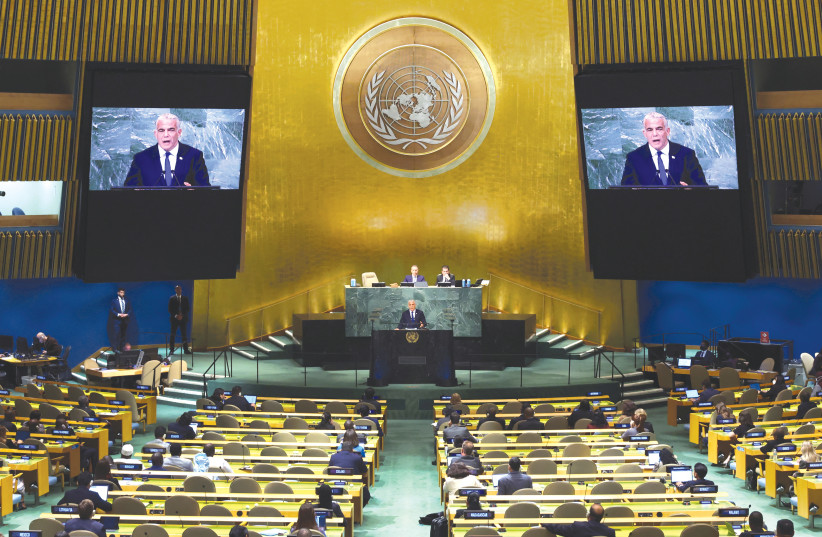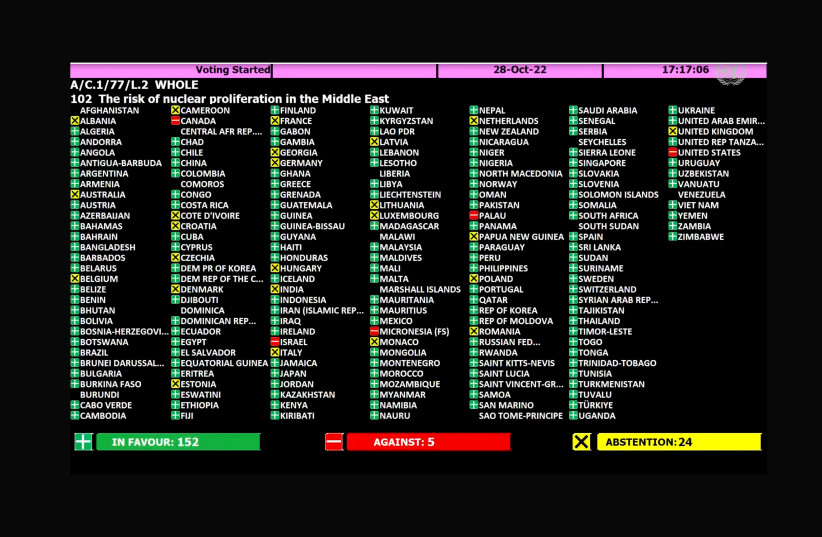Israel never admitted to possess nuclear weapons, but nevertheless, the UNGA resolution was aimed at Israel, not Iran.

Israel must dispose of all its nuclear weapons and place its nuclear sites under the International Atomic Energy Agency’s purview, the United Nations General Assembly’s First Committee stated in an initial 152-5 vote.
The five nations that opposed Friday’s resolution on the “risk of nuclear proliferation in the Middle East” were: Canada, Israel, Micronesia, Palau and the United States. Another 24 countries abstained, including European Union members.
The annual resolution submitted by Egypt to the UNGA in New York was sponsored by the Palestinian Authority and 19 counties including Bahrain, Jordan, Morocco and the United Arab Emirates.
Targeting Israel but not Iran
The resolution largely targets Israel, which is believed to be one of only nine nations to possess nuclear weapons. Israel has never admitted to having such weapons.
The resolution notes that Israel is the only country in the Middle East and one of the few among the UN’s 193 member states, which has not signed the Non-Proliferation of Nuclear Weapons Treaty (NPT).

Iran, which is a signatory to the treaty, is believed to be on the path to developing nuclear weapons. Despite this, the resolution did not mention Iran.
The resolution reaffirmed “the importance of Israel’s accession to the NPT and placement of all its nuclear facilities under comprehensive international atomic Energy Nancy safeguards, in realizing the goal of universal adherence to the Treaty in the Middle East.”
It further called on Israel “to accede to the Treaty without further delay, not to develop, produce, test or otherwise acquire nuclear weapons, to renounce possession of nuclear weapons and to place all its unsafe guarded nuclear facilities under the full scope of Agency safeguards as an important confidence-building measure among all States of the region and as a step toward enhancing peace and security.”
It was one of a slate of resolutions that the First Committee is approving, prior to a final vote in the UNGA plenum later this.
A nuclear-free zone in the Middle East?
On Friday, the First Committee also approved with 170 votes – including Iran – a call for a nuclear-free zone in the Middle East. Israel was the only country that opposed the text. Four countries abstained: the United States, Cameron, Comoros and Tanzania.
In a debate on the matter earlier this month, an Israeli deputy ambassador to the UN Michal Maayan said the NPT is only as relevant as the level of compliance and is not a remedy for the “unique security challenges” of the Middle East.
“Four of the five cases of serious violations of the NPT took place in the Middle East since its entry into force,” she explained.
“For decades now, Iran has been rapidly advancing its illicit nuclear programs and currently possesses large quantities of highly enriched nuclear material,” Maayan charged.
“The existence of undeclared nuclear activities in Syria remains relevant and worrisome, as well s the open questions related to the nature and operational state sow the specific sites and materials within Syria,” she said.
Lastly, Maayan explained its impossible to speak of a regional security architecture around the nuclear issue in a situation where Middle East countries do not recognize Israel’s right to exist.
“Some actors in the region claim that a comprehensive security architecture can be initiated in the Middle East, with direct engagement with Israel, without recognition of Israel’s right to exist within safe and secure borders, without reducing regional tension and the building of the necessary trust and confidence among regional states… This position is untenable,” Maayan stated.
Content retrieved from: https://www.jpost.com/international/article-720993.